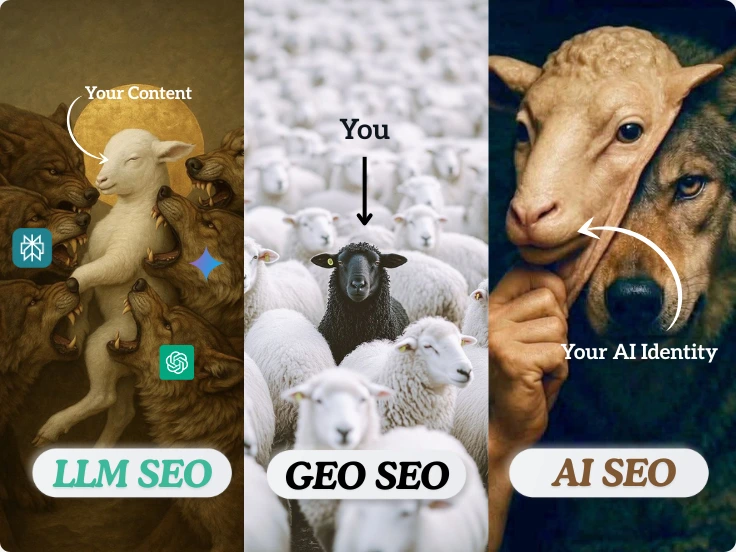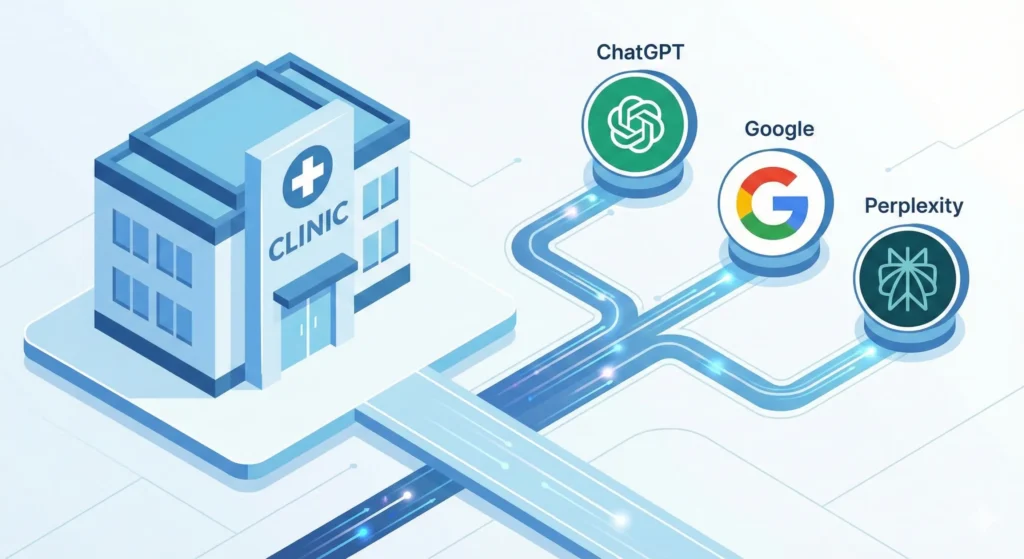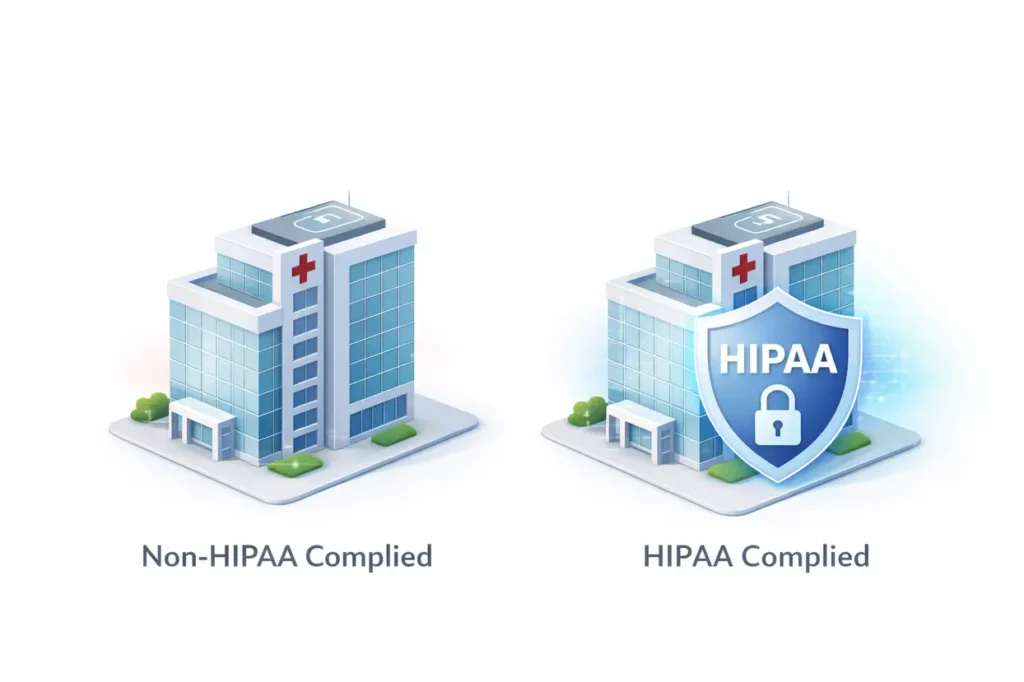If your brand isn’t showing up in ChatGPT — you’re not even in the conversation.
It’s not just about ranking anymore.
In 2025, search behavior has shifted so dramatically that 60% of people now get their answers without clicking a single link, all thanks to AI overviews and tools like Gemini, Claude, and ChatGPT.
Still focusing only on Google’s traditional search results? That’s like showing up to a digital race with a map from 2015. The real traffic and real leads are flowing through smarter, AI-powered systems that don’t play by old SEO rules.
That’s why today we’re breaking down a shift that’s confusing even the pros:
We’ll unpack three terms that may sound similar but work very differently in practice:
- LLM SEO → How to get your content recommended inside ChatGPT and other large language models
- AI SEO → How to use AI tools to research, write, and scale your SEO workflow
- Geo SEO → How to stay visible to nearby customers who are ready to take action
This isn’t just a rebranding of SEO, it’s a restructuring.
If you want to be seen, selected, and trusted by both machines and people in 2025, understanding the difference between these three layers is no longer optional
What is LLM SEO?
Imagine someone asks, “What’s the best SEO agency for startups?”
But instead of Googling it, they type it into ChatGPT, and instantly get a summarized answer naming a few agencies, including why they’re recommended.
Now ask yourself:
What would it take for your agency or brand to be part of that answer?
That’s what LLM SEO is all about.
LLM SEO (Large Language Model SEO) is the practice of structuring your content in a way that it gets picked up, referenced, and recommended by large language models like ChatGPT, Gemini, Claude, and other AI assistants people now trust more than search engines.
These LLMs don’t operate like traditional Google bots. They don’t crawl in real-time. Instead, they:
- Pull from pre-trained knowledge (often months old)
- Prioritize clean, structured, and authoritative content
- Favor sources that sound factual, well-formatted, and contextually complete
How LLM SEO Is Different from Traditional SEO
Let’s make it simple.
- Google SEO is like trying to win the top shelf in a library.
- LLM SEO is like getting quoted by the librarian during a class — you’re not just seen, you’re the voice of trust.
With LLM SEO, you’re not optimizing for clicks, you’re optimizing to be the answer.
This means rewriting your content to sound like it was crafted for a conversation, not just a search result.
Why LLM SEO Matters in 2025 and Beyond
LLM tools are becoming the default interface for discovery.
- 60% of searches now end without a click, because users get their answer from AI itself
- 47% of Google search results already show AI Overviews above all listings
And when these tools cite you?
- It’s a stamp of credibility
- It drives indirect traffic and brand recall
- You become part of the “knowledge loop” inside AI recommendations
Stat Insight: 52% of sources cited in Google’s AI Overviews also rank in the top 10 of traditional search results
Featured snippets – which feed both Google and LLMs drive an average 42.9% CTR
Key Traits of LLM-Optimized Content
To increase your chances of being cited or summarized by an AI, structure your content like this:
- Answer-first headings
e.g., “What Is LLM SEO?”, “How to Get Cited in ChatGPT” - Bullet-point summaries
Makes your key points scannable and easy for AI to lift - E-E-A-T signals
Always include author bios, credentials, real-world examples, and transparent sourcing - Clean HTML structure
Use<h2>,<h3>, tables, and logical formatting, avoid clutter or shallow fluff
Real-World Analogy (for Agencies and SaaS Brands)
Let’s say you’re writing a blog titled “Top 5 Marketing Automation Tools for Agencies”
- A basic SEO post might stuff keywords, add vague intros, and hope to rank.
- But an LLM-optimized version would:
- Start with a direct answer: “Here are the top 5 tools, ranked by use case and price.”
- Include clean bullet lists
- Cite comparisons or credible stats
- Include author insight on which tool fits which kind of agency
Now when a founder types into ChatGPT:
“Best AI tools for marketing agencies under $100/month”
Your blog has a real shot at becoming the answer
LLM SEO isn’t about “beating the algorithm.”
It’s about being useful, credible, and structured enough that AI tools want to quote you in front of millions of users.
The game has changed.
And it’s no longer just about ranking- it’s about being recommended.
What is AI SEO?
AI SEO is all about using artificial intelligence tools to streamline the time-consuming parts of SEO, not to cheat the system, but to move faster and smarter. It’s not about ranking on AI platforms like ChatGPT. It’s about using AI to rank better on Google.
Think of it like having a team of virtual SEO assistants that never sleep.
They help you brainstorm blog topics, identify keyword gaps, write content drafts, suggest meta titles, and even simulate how your content might perform against competitors.
Here’s what that looks like in practice:
- ChatGPT or Gemini for content outlines, FAQ ideas, or rewriting blocks of text
- Surfer SEO to measure on-page SEO score and keyword usage
- Clearscope or MarketMuse to identify missing topics or strengthen topical authority
- Frase or SEMRush AI for AI-generated briefs and competitor insights
These tools don’t replace human marketers, they supercharge them.
Why agencies and brands are adopting AI SEO workflows:
- Speeds up research that used to take hours
- Helps non-writers publish content that actually ranks
- Reduces monthly content costs without sacrificing quality
- Improves velocity — you can ship 5 optimized articles instead of 1 per week
But here’s the catch: AI still has a tone problem. Content generated directly from tools often sounds robotic, flat, or worse like filler.
That’s why every AI-generated piece still needs human oversight.
Think of AI as the draft writer, but you’re still the editor-in-chief.
Stat Insight: Businesses using AI in SEO strategies saw up to a 45% increase in organic traffic in 2025
And 13% of top-ranking Google content is already AI-generated as of January 2025
Bottom line – AI SEO is not a magic pill, but it is a power tool. If used well, it turns your SEO workflow into a scalable machine. If misused, it can tank your rankings with spammy, soulless content.
Want to compete in modern SEO? You don’t just need AI.
You need to know how to direct it.
What is Geo SEO?
Geo SEO, also called Local SEO, is the strategy of making your business visible to people who are searching near you, not globally, but locally. It’s what gets a café to appear on Google Maps when someone types “coffee near me” or helps a digital agency show up for “website design in Jaipur.” Unlike general SEO, Geo SEO is about proximity + relevance.
It’s critical for any business that serves a local area, whether you’re a physical shop, a regional consultant, or a service provider targeting city-specific clients. If you rely on walk-ins, calls, or local leads, Geo SEO isn’t optional, it’s your lifeline.
Common Geo SEO components include:
- Google Business Profile – (fully optimized with service areas, images, Q&A)
- Location-specific keywords – “top UI/UX agency in Gurgaon”
- Geo-targeted blog content – city pages, neighborhood-specific case studies
- Local backlinks and citations – directories, community sites, industry associations
- Customer reviews – on Google and third-party platforms
But here’s the twist – even Geo SEO has entered the AI era.
AI-generated results on Google now factor in your location, your structured data, and your public signals to recommend local options, sometimes even before the traditional 3-pack shows.
Think of it like this:
A local pizza place that updates its Google profile regularly, posts photos, and earns reviews will get recommended more often in AI overviews than a national chain with outdated data.
Stat Insight: Google now favors content with well-structured data 82% of the time in AI-powered results.
AI-generated local suggestions are expected to drive 30% more foot traffic to real-world businesses by 2025.
And yes, AI is disrupting e-commerce too. 22% of traffic drops have been reported by online stores because of AI tools recommending products directly, bypassing websites entirely.
That’s why Geo SEO is no longer just about adding your city to a few headings. It’s about creating a data-rich local identity, one that machines can read, and humans can trust.
If you’re not showing up on the map, you’re not even in the race.
Quick Comparison Table – The Core Differences
| Feature | LLM SEO | AI SEO | Geo SEO |
|---|---|---|---|
| Main Objective | Get cited or quoted inside AI tools like ChatGPT | Use AI tools to streamline and improve SEO efforts | Appear in local results like Maps & “near me” |
| Target Platforms | ChatGPT, Gemini, Claude, Perplexity, Copilot | Google Search, Bing, blog platforms, YouTube | Google Maps, GBP, local 3-pack |
| Core Strategy | Semantic clarity, structured Q&A format, E-E-A-T | Automated keyword planning, AI writing, SERP simulation | GBP, location-based keywords, geo blogs |
| Citation Value | Very High — being cited = trust + traffic | Low, AI tools are used, not cited | Medium, citations help for local SEO |
| Common Tools | No tools, relies on how well you write & structure | ChatGPT, Surfer, Jasper, Clearscope, MarketMuse | GBP, BrightLocal, Moz Local, Whitespark |
| Must-Have Element | Snippet-ready formatting + authority cues | Prompt clarity + human-edited tone | Verified GBP listing + consistent NAP |
LLM SEO is about being the source of truth when someone asks ChatGPT a question. AI SEO is about using tech to produce content faster and better. Geo SEO is about making sure people in your city know you exist and choose you.
LLM SEO vs AI SEO: Not Interchangeable
At a glance, both seem similar, AI is involved in both. But they are fundamentally different in purpose and execution.
| Factor | LLM SEO | AI SEO |
|---|---|---|
| SEO Objective | Be the source cited by AI when users ask questions | Use AI to generate and optimize your content at scale |
| Dependency | Access to language models like ChatGPT, Gemini, Claude | Access to AI-powered SEO tools and writing platforms |
| Content Influence | Based on clarity, expertise, citations, and structured formatting | Based on real-time SEO data, keyword density, semantic scoring |
| Use Case | Being named when someone asks ChatGPT “Best web agency in India” | Creating a RankMath-optimized blog draft using ChatGPT or Surfer SEO |
| Measurement | Mentions or quotes in AI responses | Higher rankings on SERP or improved content velocity |
The overlap is that both need quality, but LLM SEO is about influence, while AI SEO is about efficiency. One helps you get cited. The other helps you create the kind of content that gets there.
🎯 New KPI Alert: Citations in AI-generated answers are now being tracked as measurable performance goals by top agencies.
Google vs. LLMs, Who’s Actually Reading Your Content?
This is where most SEO strategies break. People write for one system, Google and ignore the other.
Let’s clarify how both systems “read” you:
- Google is built on crawlers. It indexes your website, looks at freshness, keywords, schema, page speed, and backlinks.
- LLMs are built on training. They don’t crawl your site in real time, they draw from static knowledge, clarity of structure, and conversational logic.
That leads to a major strategy difference:
Google rewards freshness, structured data, keyword usage, site signals
LLMs reward clarity, completeness, human tone, and trusted sourcing
Here’s what happens if you only optimize for Google:
- You might rank, but you’ll never be mentioned in ChatGPT
- Your blog may load fast, but AI won’t quote your vague, generic content
- You’ll miss LLM traffic, which is growing by the minute
Stat Insight: 65% of AI-generated responses depend on readability and NLP-optimized formatting.
In short: Google indexes pages. LLMs quote answers. You need to please both.
How to Combine All Three, The “Layered Visibility” Strategy
Don’t treat these as three different types of SEO.
Treat them as three levels of discoverability. Each adds one layer of visibility to your brand and when combined, they future-proof your content from every direction.
Here’s the winning combo for 2025+:
- AI SEO: Use AI tools like ChatGPT or Surfer to speed up outlines, content drafts, and metadata suggestions, but always edit manually for tone and flow
- LLM SEO: Format each piece of content with an answer-first layout, use semantic headings (“What is…”, “How does…”), add bullet summaries, author details, and cite real studies
- Geo SEO: Add a local layer, city-specific keywords, Google Business Profile optimization, photos, maps, and client reviews to show you’re real and nearby
💡 Stat Insight: 75% of digital agencies now use blended “Generative SEO” strategies combining all three approaches
Final Takeaway: Don’t Just Rank, Be the AI’s Answer
The future of search is not just blue links. It’s chat interfaces, voice assistants, AI snippets, and instant answers.
If your content isn’t formatted to show up in those answers, you’re invisible to half the internet.
Ask yourself:
If someone types “Top AI web agencies for small business” into ChatGPT , does your brand show up?
If the answer is no, you’re missing the next wave of organic discovery.
So stop thinking only in keywords. Start thinking in answers.
Key Stats Recap, In One Glance
| Insight | Value |
|---|---|
| AI overviews now appear in Google search results | 47% |
| AI Overviews cite sources that already rank in Top 10 | 52% |
| Organic traffic boost from using AI SEO tools | 45% |
| Local AI search expected to increase in-store visits | 30% |
| Generative SEO adopted by digital agencies in 2025 | 75% |
RankVed’s AI-First SEO Stack, Built for 2025
If you want your agency or business to show up in Google and ChatGPT, we don’t just write blog, we engineer AI-friendly visibility.
At RankVed, we combine:
LLM SEO → So your content gets cited by AI tools used by millions
AI SEO → So your content gets created 5x faster, but still sounds like you
Geo SEO → So local customers see you first, in Maps, snippets, and AI results
Let’s audit your site and build your custom blueprint.













